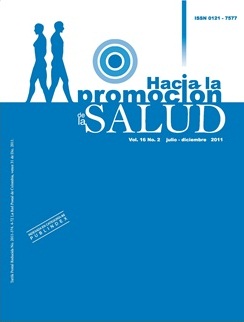Authors
Abstract
Objective: To discover the professors’ expressions related to self care in comprehensive education at Universidad de Caldas, Manizales, between 2008 and 2010. Method: An interpretive-qualitative study in which meaning and sense that comprehensive education has for the professors and their relation with self care, are investigated. Work unit: 34 professors; analysis unit: expressions provided by professors in focal groups. Informed consent from the participants was requested. Analysis categories: Being, knowledge, being aware of, acting and interacting. Findings and discussion: “I start from the supposition that it is the students’ negotiating ability which allows them to self-regulate. This capacity implies a human dimension because it is a requirement, as well as it is the cognitive ability, which must be integrated as a particular life condition to work in the complexity of cognitive and executive functions. The capacity to self-govern allows me to manage my own life and place myself having all possibilities at hand.” It seems to be that the problem of self care refers to the conscience of what life, body, health, and welfare are all about, including all spheres that constitute the human beings. Conclusion: comprehensive education is achieved by means of an educational process; it indicates those actions directed to the future which educate and involve professors. This is to say what includes the way in which a person teaches. It allows the enrichment of committed people in the sense that they guide students towards the perfectionism of their qualities and virtues. Professors highlight the importance of their academic actions as an emulator for the students.
References
Flacso. Módulo 1, parte 2. Determinantes sociales de la salud. [en línea] 2010 [citado 2010 sep 25]. Disponible en URL: http://salud.ciee.flacso.org.ar/files/flacso/pdf/Modulo1.pdf
Uribe T. El autocuidado y su papel en la promoción de la salud. [en línea] 2010 [citado 2011 May 30]. Disponible en URL: http://www.bvsde.paho.org/bvsacd/cd26/fulltexts/0467.pdf
Ferrater J. Diccionario de Filosofía. 2a Edición. Barcelona: Ariel; 2009.
Morin E. Los siete saberes necesarios para la educación del futuro. Bogotá D.C.: Republica de Colombia, Ministerio de Educación Nacional, UNESCO; 2000.
Vanegas J. El cuerpo a la luz de la fenomenología. Manizales: Universidad Autónoma de Manizales; 2001.
Acodesi – Flacsi. Propuesta educativa de la Compañía de Jesús. Bogotá; 1999.
Colombia. Ley 115 de 1994. [en línea] 2011 [citado 2011 Jun 30]. Disponible en URL: www.unal.edu.co/secretaria/normas/ex/L0115_94.pdf
Ivanovich Oparin A. El origen de la vida. Moscú: Principia Editores; 1923.
Neil R. Filosofía y ciencia del cuidado. En: Modelos y teorías en enfermería. Madrid: Elsevier Science; 2002.
Taylor S. La teoría enfermera del déficit de autocuidado. En: Modelos y teorías en enfermería. Madrid: Elsevier Science; 2002.
Núñez J. Las seis versiones de la bioética. Persona y Bioética 1998; 2(4). Santafé de Bogotá: Universidad de la Sabana.
Muñoz L, Ruiz C, Arias M. Prácticas de autocuidado de la salud de la mujer. En: Dimensiones del cuidado. Facultad de Enfermería. Universidad Nacional de Colombia; 1998.
Gómez R. La dignidad humana en el proceso salud enfermedad. Bogotá: Universidad Externado de Colombia; 2008.
Fakouri C. El modelo de introspección, cuidado y curación. En: Modelos y teorías en enfermería. Madrid: Elsevier Science; 2002.
Brennan B. Manos que curan. Santafé de Bogotá: Círculo de Lectores; 1991.
Mejía O. De la prehistoria a la medicina egipcia. Manizales: Universidad de Caldas; 1999.


 PDF (Español)
PDF (Español)
 FLIP
FLIP






















